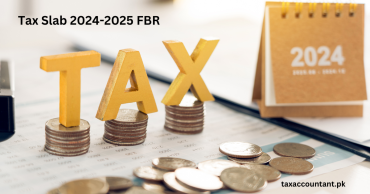Navigating the intricacies of tax regulations is essential for both individuals and businesses in Pakistan. The Federal Board of Revenue (FBR) has outlined specific tax slabs for the fiscal year 2024-2025, which reflect significant changes aimed at addressing the country’s economic challenges.
In this blog article, we will explore about the details of these tax slabs, their implications, and how they affect various income groups.
Overview of Taxation in Pakistan
Taxation in Pakistan serves as a primary source of revenue for the government, funding essential services and infrastructure. The FBR is responsible for implementing tax policies, which include income tax, sales tax, and various other levies.
Importance of Understanding Tax Slabs
Understanding tax slabs is crucial for:
- Financial Planning: Individuals can make informed decisions regarding their finances.
- Compliance: Awareness helps taxpayers comply with legal obligations and avoid penalties.
- Budgeting: Knowledge of tax liabilities aids in effective personal or business budgeting.
Income Tax Slabs for 2024-2025
The income tax slabs for salaried individuals have undergone notable revisions. Below are the key slabs as per the latest regulations:
- 0% Tax Rate: For taxable income up to Rs. 600,000.
- 5% Tax Rate: For income exceeding Rs. 600,000 but not exceeding Rs. 1,200,000. This means that individuals will pay 5% on the amount that exceeds Rs. 600,000.
- 15% Tax Rate: For income exceeding Rs. 1,200,000 but not exceeding Rs. 2,200,000. The calculation here includes a fixed amount of Rs. 30,000 plus 15% on the amount exceeding Rs. 1,200,000.
- 25% Tax Rate: For income exceeding Rs. 2,200,000 but not exceeding Rs. 3,200,000. This includes a fixed amount of Rs. 180,000 plus 25% on the amount exceeding Rs. 2,200,000.
- 30% Tax Rate: For income exceeding Rs. 3,200,000 but not exceeding Rs. 4,100,000. The calculation involves a fixed amount of Rs. 430,000 plus 30% on the amount exceeding Rs. 3,200,000.
- 35% Tax Rate: For income exceeding Rs. 4,100,000. This includes a fixed amount of Rs. 700,000 plus 35% on the amount exceeding Rs. 4,100,000.
Detailed Breakdown of Tax Changes
Changes in Income Tax Rates
The new tax structure reflects an increase in rates for various income brackets:
- Individuals earning between Rs. 50,000 to Rs. 100,000 monthly will see their tax rate double from 2.5% to 5% on income above Rs. 50,000.
- Those earning between Rs. 100,000 to Rs. 200,000 will now pay 15% instead of 12.2%, along with a fixed sum adjustment from Rs. 15,000 to Rs. 30,000 annually.
- For monthly incomes ranging from Rs. 200,000 to Rs. 366,000, the tax rate has increased from 22.5% to 25%, with annual fixed amounts raised accordingly.
Impact on Higher Income Brackets
The upper two slabs have been merged:
- A new flat rate of 35% applies to monthly salaries over Rs. 342,000, previously applicable only to those earning above Rs. 1 million monthly.
Implications for Different Income Groups
Understanding how these changes impact different segments of society is crucial:
Lower Income Groups
For individuals earning below Rs. 600,000 annually:
- They remain exempt from taxes which provides some relief amidst rising inflation and economic challenges.
Middle Income Groups
Individuals earning between Rs. 600,000 and Rs. 1 million will experience a slight increase in their tax burden but remain relatively unaffected compared to higher earners.
Higher Income Groups
Those earning above Rs. 1 million will face significantly higher taxes due to increased rates and reduced exemptions:
- This could lead to changes in spending habits and investment strategies as individuals seek to manage their tax liabilities effectively.
The FBR’s new tax slabs for the fiscal year 2024-2025 represent a strategic shift aimed at increasing revenue while addressing economic challenges facing Pakistan today. Understanding these changes is vital for effective financial planning and compliance among taxpayers.As individuals navigate this new landscape:
- Staying informed about tax obligations can prevent unexpected liabilities.
- Engaging with financial advisors may provide tailored strategies to optimize tax responsibilities.
In summary, knowledge about these tax slabs not only empowers individuals but also contributes to broader economic stability through enhanced compliance and informed decision-making practices across all income groups in Pakistan.














